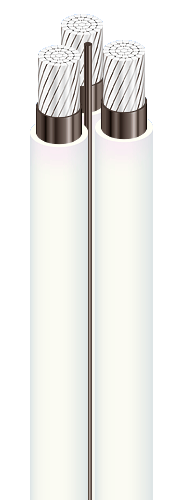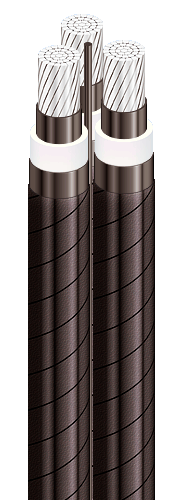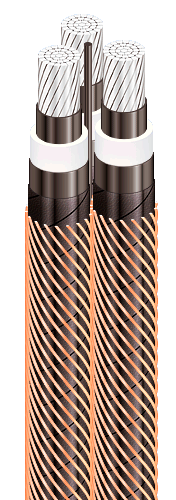ÀÏâÝãàÏíã-HF-6 3x240
ÒÓ Ó 31.3-00214534-058:2007 |
| Power cables with aluminium conductors, flame-retardant and halogen-free, with XLPE, longitudinal and transverse screen sealing and polymer compound outer sheath |
| Technical cable requirements correspond to IEC 60502-2 |
|
|
|
| Cables are used for laying: |
| • in premises, tunnels, ducts, mines, dry soil and outdoor under shelter |
| • at sites, where low smoke and corrosive gas emission are required (NPP, subway, large industrial facilities, high-rise buildings, etc.) |
| • single laying |
|
|
|
It is possible to manufacture cables with extruded semiconductor layer along outer sheath.
Order entry example: |
| ÀÏâÝãàÏíã-HF-Ï–6 3x240/25 ÒÓ Ó 31.3-00214534-058:2007 |
| An extruded semiconductor layer along outer sheath ensures the correct testing of cable line with sections of underground laying in polymer pipes. To learn more. |
|
|
|
It is possible to manufacture cables with an integrated fiber-optic module.
Order entry example: |
| ÀÏâÝãàÏíã-HF-6 3x240/25 (ÎÌ) ÒÓ Ó 31.3-00214534-058:2007 |
| In conjunction with the DTS system, the integrated fiber-optic module can act as a distributed cable line temperature sensor. To learn more. |
|
|
|
It is possible to manufacture cable with sealed conductors.
Order entry example: |
| ÀÏâÝãàÏíã-HF-6 3x240/25 (ã) ÒÓ Ó 31.3-00214534-058:2007 |
|
|
|
| It is possible manufacturing of cables in versions (A) and (B), flame-retardant when laying in bunches |
|
|
|
| Fire safety code in accordance with ÄÑÒÓ 4809:2007: ÏÁ102122000 |
| Products of this mark meet the requirements: |
| • single wire cable flame retardance |
| • toxicity class Tk2 of the combustion products of nonmetallic elements (toxicity index from 40 up to 120 g/m3) |
| • class ÄÒê1 on smoke-forming ability by smouldering of non-metallic elements (coefficient of smoke formation from 50 to 500 m2/kg) |
| • class ÄÏê2 on smoke-forming ability by combustion (minimum luminous flux more than 60 %) |
| • corrosive class Êê2 of combustion products of non-metallic elements (the number of halogen hydrides less than 150 mg/g, pH more than 4.3, specific conductivity less than 10 µS/mm) |









































































